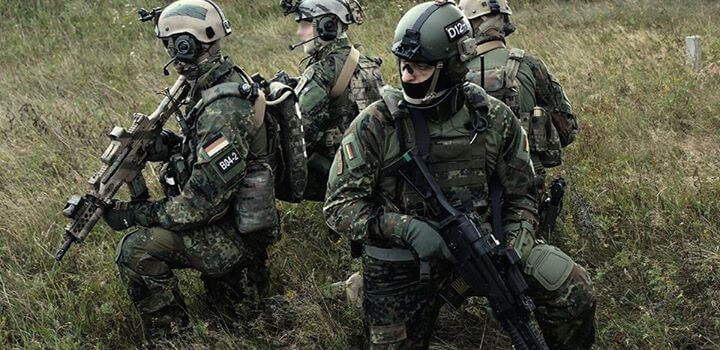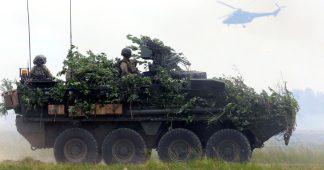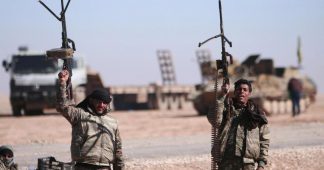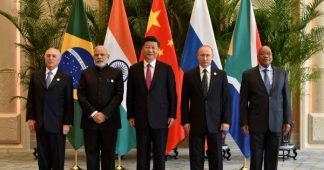By Eddie Haywood
20 October 2017
The war being conducted in West Africa by the United States in partnership with its European counterparts France and Germany, which was exposed by the killing of four US special forces soldiers in Niger earlier this month, is setting the stage for a much broader war in the region.
In June, France presented a draft resolution before the United Nations Security Council to gain funding for the joint military force. The terms of the UN authorization would redefine the character and scope of the G5 Sahel proxy force led by France, giving it broad operational authority similar to the UN Force Intervention Brigade utilized against Rwandan M23 rebels in Eastern Congo in 2011.
In closed-door negotiations, Washington balked at the resolution, saying that it would prefer the Security Council give its blessing in a statement instead of a resolution. Behind Washington’s opposition to a resolution is concern that France may gain a strategic advantage over the US in the region which is rich with uranium and mineral deposits.
With its expansion of military operations across West Africa in recent years, Washington is seeking to assert full geopolitical control over the region. Lt. Gen. Kenneth McKenzie admitted last week that the US has 1,000 troops deployed across the countries which border Lake Chad: Niger, Nigeria, Chad and Cameroon. This military buildup has been done entirely behind the backs of the American people without any public debate.
Underpinning the strategic prerogatives of the American and French military forces arrayed across the region is West Africa’s significant deposits of minerals, such as uranium, iron ore, gold and diamonds, as well as vast oil and gas reserves, which American and French corporations are seeking to extract and yield significant profits.
Entering in the fray is Germany, which announced late last year its plans to construct an airbase in Niamey to support its troops serving in MINUSMA, the UN mission in neighboring Mali. The 10,000-strong UN force is made up of various contingents of troops from several Western countries, including The Netherlands, Denmark, Norway, Sweden and Italy.
AFRICOM, the US military command overseeing operations across the vast African continent, has established a base in Niamey, Niger, and maintains 800 special operations troops in the country. At the base in Niamey, Air Force personnel operate a drone surveillance program capable of conducting reconnaissance missions in Niger, Mali, Nigeria, and as far as Libya.
Several MQ-9 Reaper drones armed with Hellfire missiles, which the US uses to carry out its assassination program, are also based in Niamey. The construction of a base in Agadez, a city in central Niger, will expand the drone program’s capabilities, allowing for further-range flights.
In 2016 alone Washington spent $156 million to train Chadian, Nigerien, and Nigerian forces for the ongoing US-led offensive against Boko Haram in northern Nigeria.
Underscoring Washington’s ultimate concerns in West Africa, AFRICOM’s April 2017 posture statement noted: “Just as the U.S. pursues strategic interests in Africa, international competitors, including China and Russia, are doing the same.” Rather hypocritically, the statement raised the concern, “We continue to see international competitors engage with African partners in a manner contrary to the international norms of transparency.”
The establishment of US, French, and German bases across the region, in particular in Niger, Mali, Cameroon and Chad, near the locations of mining operations, oil extraction facilities and oil pipelines, makes clear these military forces are enforcing territorial control over these strategic resources.
They are also seeking to use their military power to offset the entry of China into the region, which in 2012 hammered out agreements with the Niger, Chad and Cameroon governments to transport oil from the CNPC-operated refinery in Zinder, Niger for export, utilizing the Exxon-Mobil-constructed Chad-Cameroon pipeline.
The expansion of Western imperialist military forces into the region began in earnest with the 2011 US/NATO war of regime change in Libya, which resulted in Libyan leader Muammar Gaddafi’s assassination and the devastation of Libyan society, with US-armed and trained Islamist fighters with ties to Al-Qaeda acting as the ground troops.
The consequence of Washington’s recklessness in utilizing these Islamist proxy forces to carry out its dirty work in Libya has resulted in these Islamists fighters spilling forth across North Africa, and down into the Sahel, turning the region into a battlefield, and threatening the operations of Western corporations, particularly in the oil and gas and mining extraction sectors, in Niger, Chad, Nigeria, Mali, Cameroon, Burkina Faso and the Ivory Coast.
Originally consisting of three groups, the Islamist fighters have largely united with Al-Qaeda in the Islamic Mahgreb (AQIM), with others such as Boko Haram in Nigeria, pledging allegiance to Islamic State (ISIS).
Underlining the “scramble for Africa” initiated by the Obama administration and continued under Trump is the longer term “rearmament” of America’s foreign policy following the dissolution of the Soviet Union, with Washington taking the sudden disappearance of its long-standing geopolitical rival as an opportunity to embark on a military campaign for global hegemony, seeking to offset its economic weakness by military dominance.
America’s military offensive in West Africa, along with France and Germany, and their combined ambition to lay claim to the region’s vast economic resources, guarantee ever-widening military operations that threaten to spark a much broader regional war.











